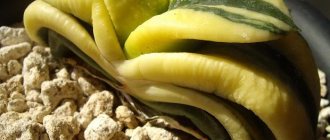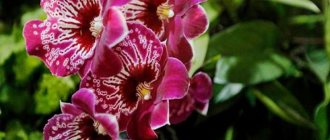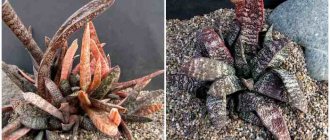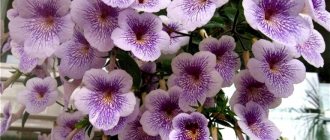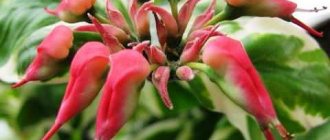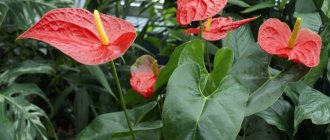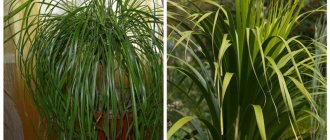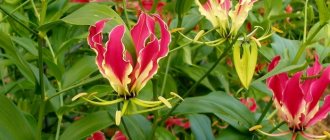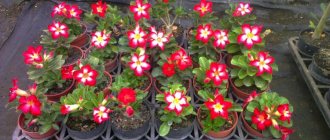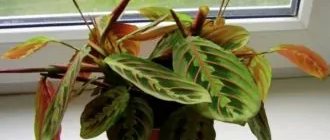Native to the arid regions of South Africa, Gasteria is a succulent from the Asphodelaceae family. The name of the plant comes from the resemblance of the flower to the stomach.: It has a peculiar swelling at the bottom of the perianth tube.
An unpretentious gasteria, the photo of which demonstrates the spectacular appearance of the plant, is ideal for novice gardeners.
Description of the plant
In its natural environment, the habitats of the succulent are rocky slopes and valleys of Africa, the Mediterranean, and Central Asia.
Resistance to changes in temperature conditions and low maintenance requirements have made it a popular indoor flower , often found on window sills.
The culture is often confused with haworthia and aloe, which are also representatives of the asphodelaceae.
Gasteria has a greatly shortened stem, which is covered with rigid foliage arranged in two rows, growing in a spiral. Dark green leaf blades of various shapes are decorated with a pattern of various spots or stripes along the entire surface of the fleshy base. Depending on the variety, the leaf surface may be rough or smooth, as well as flat or slightly concave. The length of the leaf with a pointed or rounded upper part varies from 4 to 25 cm, while the width does not change.
Flowering of a succulent occurs when the plant throws out an arrow 40-100 cm long after each row of leaf blades. The peduncle is topped with a racemose inflorescence consisting of yellow, green or orange flowers in the form of amphorae. They bloom, hanging on short legs, in turns, which extends the flowering period for a month.
Attention! To date, we know about a number of hybrids that appeared as a result of crossing gasteria with aloe and haworthia - gastrolea and gasterworthia, respectively.
Species diversity
The genus Gasteria has about 70 varieties , which is associated with easy natural hybridization between species. No more than 20 species are bred at home, and even an inexperienced indoor plant lover can cope with growing them.
The most popular types:
- Gasteria Armstrong is a compact plant with thick, wrinkled, marsh-colored leaves arranged in two rows, reaching a maximum height of 10 cm. The edges of the leaf plate, 6 cm long and 4 cm wide, have a blunt shape. During flowering, orange-red flowers bloom.
- Gasteria warty - the species has narrow, rough leaf plates with pointed ends, 20 cm long, strewn with small white warts. Pink or red flowers with green splashes are located on a long peduncle of 80 cm.
- Gasteria keeled - the plant is distinguished by the arrangement of its leaves in a spiral and the presence of a sharp keel on their underside. The almost smooth leaf, with the exception of the rough leaf and keel edges, is covered with a few warts.
- Gasteria maculata is a short-stemmed species that is covered with dark green leaves with a spotted pattern. An almost smooth, fleshy leaf blade with a slightly convex shape and a narrowed upper part reaches 20 cm in length. When flowering, intense red flowers bloom.
- Gasteria dwarf is the smallest variety, completely identical in appearance to the previous species. An adult specimen with dark green leaves with light spots and a border does not exceed a height of 6 cm. The flowers have a pink tint.
- Gasteria Batesiana - the rosette of this species consists of dark green leaves 18 cm long, having a triangular-lanceolate shape and a smooth surface with numerous light-colored tubercles. The length of pink-orange flowers can reach 4 cm.
- Gasteria saber -shaped is a stemless species with green shiny leaves of a convex shape that form a rosette. The length of the wide sword-shaped leaf plate with a keel, covered with whitish warts, is 30 cm, and the width is 7 cm. During flowering, the plant throws out an arrow 1 m long with inflorescences of intense red flowers.
- Gasteria bicolor is a large representative of the genus with tongue-shaped leaves up to 30 cm in length and has a larger rosette compared to other varieties. The dark green leaf blade is chaotically covered with white spots.
- Gasteria soddy is a species that does not have a stem, with dark green leaves of a slightly convex shape arranged in rows, which are strewn with small light inclusions. The flowers come in red or pink tones.
- Gasteria whitish is a stemless variety with intense green wide sword-shaped leaves, the length of which does not exceed 30 cm and the width - 7 cm. Rich red flowers up to 5 cm form a racemose inflorescence located on a long arrow of 1 m.
- Gasteria marbled is a species with spirally arranged leaves folding into a rosette. A luscious marble leaf plate is painted with silver spots on a glossy green background.
- Gasteria triquetrum is a species in which at a young age the leaves are arranged in two rows, and over time they form a rosette. The length of the leaf plate, tapering from the middle and having a hard sharp spike of 3 mm at the end, reaches 20 cm. Its surface is replete with elongated light green spots, forming transverse stripes. The cartilaginous-toothed edges and the keel are painted in light shades. The plant blooms pink.
Care in an indoor environment
Undemandingness is a characteristic feature inherent in any succulent, not excluding gasteria.
Choosing a location and lighting
The light-loving plant does not tolerate direct sunlight . The bright sun causes the leaves to lose patterns.
The best choice would be to place the pot on a windowsill on the south or west side of the house.
Attention! Gasteria develops well in light from an artificial source.
Temperature
According to the scientific literature, for successful growth, the culture requires moderate temperature conditions. In theory, in summer it should be 18-20°C, and in winter - 10-14°C. In practice, the plant demonstrates excellent growth at home .
The main requirement when growing a succulent in an apartment environment:
- in winter, place the pot away from heating appliances and closer to the window glass, protecting it from frosty air masses during ventilation;
- in summer, move the flower to fresh air - a balcony, loggia, street.
Watering and air humidity
The criterion for a flower's summer need for watering is the drying of the soil: excessive moisture is detrimental to the plant, as is prolonged drying out. During the winter season, the succulent can do without moisture completely.
Advice! If your apartment is hot in winter, you should water the flower every month.
The succulent is a representative of desert regions, so it prefers fairly dry air without the need for additional spraying. But he would appreciate a cool shower to clean the leaves of dust.
Bloom
If you follow the rules of comprehensive care, the plant can please the owner with flowering.
In spring or summer, you can watch about 50 uniquely shaped flowers bloom one by one.
Attention! The possibility of flowering is excluded if the gasteria flower is located on windows in a northern direction.
Priming
Any substrate for succulents available in flower shops is suitable for cultivating the plant.
If you wish, you can make a soil mixture with your own hands: mix leaf soil, peat and sand in a ratio of 2:1:1.
Advice! To increase air and moisture permeability characteristics, you should add some brick granules.
Top dressing
Fertilizers for succulents are applied every two weeks only during the growing season - from May to September. Fertilizing is carried out with special complex fertilizers for succulents or cacti at half the rate . During the resting phase, the plant does not require additional nutrition.
Transfer
Despite the slow growth rate, the succulent needs to be replanted annually into a slightly wider pot by transferring it while preserving the soil ball.
Before replanting, which takes place in spring or summer, the babies are separated from the mother specimen.
Attention! The flower does not like large containers, developing better in cramped pots where there should be a drainage layer.
Reproduction
The optimal method for breeding gasteria is the vegetative method - separating the babies or cuttings. The cut cutting, like the separated daughter rosette, is dried and placed in the ground.
An experienced gardener, if he has achieved the flowering of a succulent, can try to use the seed method of propagation, for which he first needs to carry out manipulations for pollination: shake the plant so that the pollen settles on the stigmas of the flowers. After 2-3 months, when the seeds ripen, the following actions are performed with them:
- sown on well-moistened soil;
- cover with plastic film;
- organize regular ventilation;
- as the soil dries, moisten it with a spray bottle;
- After growing, the seedlings dive into pots.
Diseases and pests
Gasteria is not often affected by pests, but sometimes infection occurs:
- aphids are a rare phenomenon that is visible to the naked eye;
- scale insects - light spots appear on the leaves, which soon fall off;
- Mealybug - white waxy discharge forms on the leaves.
- spider mites - cobwebs and very small insects are visible on the leaves.
In order to cope with pests, insecticides are used according to the instructions. They are presented in a wide range in stores. Spraying with insecticide is carried out repeatedly.
-The hardest thing to fight is the spider mite . Insecticides do not help in this case; acaricides must be used. Spider mites love dry air, which creates ideal conditions for its development. To prevent spider mites, the air should be kept moist.
Also read: Crassula the Hobbit and Gollum an unusual type of money tree
-In addition to rare pest damage, gasteria can cause illness. The most common disease is rotting from overflow . Then the plant is affected by gray rot. When the soil ball is often too dry, then dry brown spots appear on the leaves. It is better not to water Gasteria if you are not sure of the need for watering. If decay has already begun, the plant should be removed from the pot and inspected. Carefully clean out all rotten areas.
It happens that there is no need to remove the plant completely from the pot when only the leaves are affected. The cut areas should be sprinkled with crushed charcoal for disinfection. Then air dry the flower for 24 hours. And then plant it in a new prepared substrate. It is better not to water the plant for about a week, so as not to cause further development of gray rot. Then carefully resume watering.
-Gasteria can be affected by fungal and bacterial infections . Fungal rot occurs when the plant is cold. This type of rot develops slowly. Bacterial rot, on the contrary, occurs when the flower is hot. In this case, the flower dies in a couple of days. It is necessary to regularly inspect the leaves to identify diseases. A diseased plant must always be isolated from other flowers.
-Excessive sun can also harm gasteria leaves. When exposed to excess sunlight, the plant becomes very red and can get burned, which damages the leaf permanently. You need to be especially careful at the beginning of spring, when solar activity increases sharply and the plant can be damaged.
Difference between Gasteria and Haworthia
The easiest way to distinguish these plants is when they are flowering . The petals of gasteria flowers are completely fused and tubular in shape. Havoria has a well-defined bent segment of the upper part of the petal, fused to half. Also, the young Gasteria plant is distinguished by its opposite leaves and large size, in comparison with the smallest succulent, Haworthia.
This video details the differences between three types of asphodel succulents - aloe, haworthia and nasteria:
So, gasteria is not only an exotic flower that, with minimal care, will delight the owner with a spectacular fan of leaves, but also a powerful amulet - so the signs say. And after the plant is in the bedroom, the owner will discover its beneficial properties, which include the ability to enrich the room with a large amount of oxygen at night.
Reproduction
Gasteria is usually propagated vegetatively by separating young shoots or leaf cuttings. Seeds are used less frequently, but this does not mean that propagation by seeds is problematic.
When we buy fresh seeds, the percentage of seeds that germinate will be very high. Seeds are sown in a permeable and warm substrate; it is best to use a propagator.
Returning to vegetative propagation, in the case of shoots everything is very simple, just cut a young plant, let it dry for 1-2 days and plant it in a very permeable substrate.
When propagating Gasteria from leaf cuttings, be sure to dip them in a rooting agent (β-indoleacetic acid) before planting and allow to dry. We modestly water such a seedling after 2-3 weeks, when the first roots appear. Cut leaf cuttings at the root.
